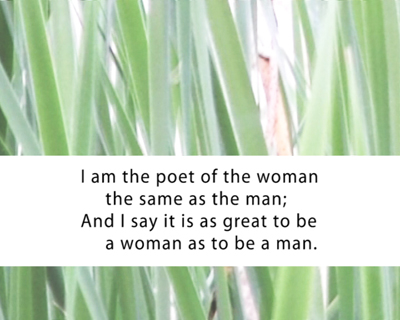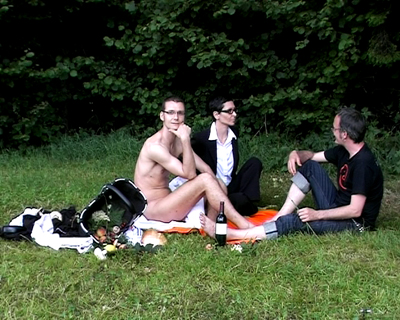home > new and ongoing > timeline
- - - <de>
code flow - events
Digitaler Dachstock #2
luncheon on the grass - postproduction by code flow
17 August - 19 November 2006
at the Digitaler Dachstock of Haus für Kunst Uri
(the museum will be closed from 25 September to 20 October)

The project was shown on the entire top floor of Haus für Kunst Uri. On one end, a looped video projection onto a big screen, in a cinema atmosphere, with two new video works especially produced for the occasion by code flow, the rest of the floor a media laboratory with a retrospective of video works by Dimitrina Sevova, consisting of sex male sex female (remastered on DVD, 9’17’’; 1997), merry-go-round (remastered on DVD, 4’53’’;1998) and three short videoportraits (remastered on DVD, 4’01’’; 1999), and an archive and library of code flow works, some of them online, such as the code flow museum, Dimitrina Sevova’s “In Someone Else’s Skin” and three Web-based e-books by code flow (“CFront – Crossing Points East-West”, “KonsequenZ” and “Critique of Pure Image – Between Fake and Quotation”).
Artists' Statement by code flow
On its continuous search for more reality and nature, code flow produced two new video works relating to the local context of the Haus für Kunst Uri in Altdorf in which the Digitaler Dachstock is taking place. The two films interact with myths and how these are created and invented, and with accepted roles and their performative transgression. They explore what happens to nature and reality as they are broadened by the omnipresence of technologies. code flow go out into nature like the artists of the end of 19th century. Today the artist following their gesture to find new creativity, artistic freedom, inspiration for new subjects finds himself grappling with stereotypes, signs, codes, quotes, memory, and information in an era of digital reproduction. He or she invariably remains in the role of the tourist, the consumer of images seen through clichés, who comes, sees and appropriates existing impressions to remix new images in a process of postproduction.
In luncheon on the grass – postproduction by code flow (DVD, 8’27’’; 2006) code flow gazes at simple things of the landscape, the leaves of grass merrily rocking in the wind, each growing in its own direction. Verses from Walt Whitman’s Leaves of Grass (various editions 1855-1897) emerge, on a sound piece in which the hissing wind and children’s shouts mix in with the pathos of Rossini’s Sinfonia from his opera William Tell (1829). This first part merges into the view of a meadow on which we recognize a very familiar composition, of the famous masterpiece by Edouard Manet, Luncheon on the Grass (1862/63). In a nonchalant superficial performance, a woman in business clothing, lady’s trousers and jacket, an outfit that would make her appear as a distinguished office worker in an office setting, is having a picnic on the grass with a man in everyday clothes. In front of them a man, undressed. Our perception is tricked: without being masked or disguised in any way, purely on the basis of our expectations towards gender roles in specific situations, in this setting the perception is displaced, and the woman in business clothing and the naked man are perceived as playing the role of a man and a naked woman. The viewer’s perception exchanges their roles. The performance unfolds in an artificial soundscape, with a fragment of a duet from William Tell in which the supposed enemies Matilde and Arnoldo declare their romantic love – while the mythical heroic figure of Tell sings of his love for his lost fatherland.
Our second video piece altdorf sightseeing tour – your guide: code flow (DVD, 13’56’’; 2006) reflects our double position not only as artists looking for inspiration, but also as curious tourists visiting Altdorf. It plays with the gesture of the artist going out into nature, a gesture that remains popular in the compulsory photography of banal views typical of contemporary tourism. A sequence from the film Beyond the Clouds (1995) by Michelangelo Antonioni and Wim Wenders takes up the cue from the confusion with gender stereotypes and the expectations of the viewer from the first video. The glamour and nimbus of the male creator stroking away at the nature on his canvas are torn down, and he appears as a pitiful old imitator of gestures. The lady appearing out of nature does not become his romantic inspirer, but turns out to be an old and spiteful anti-muse who cannot keep her mouth shut. In the slide show that follows, we turn the roles around, and serve as tourist guides for the locals and any other visitors to the museum, in an imitation of the tourist gaze. In the era of images, as described by Susan Sontag in her book On Photography (1977), and all the more so with the development of tourism arising with the changes in economic conditions, most people often find themselves, usually on weekend trips or during their holidays, trying to deal with the obligatory digital camera in their hands, or at the very least with the camera function of their mobile phone. This relation, this gaze that was previously reserved to the artist, what happens to it when it is extended to everyone carrying a digital camera? And how does this accessibility, this populism in the creation of images and digital reproductions, influence a new artistic approach dealing with digital technologies? In the era of digital reproducibility, of deejaying and remixing, of quoting the quote of a quote, in the era of postproduction, there is no copy and no original.

Artist's Statement by Dimitrina Sevova
A short retrospective of selected video pieces from 1997-1999 related to body politics.
sex male sex female (remastered on DVD, 9’17’’; 1997)
The film looks at the new phenomenon of the beauty industry in post-socialist Bulgaria, in which the yearning for eternal youth and the dream of a standardized body become a convertible commodity, and the change in the aesthetic criteria for the body, and its resocialization in the new urban space. Two documentary sequences projected in parallel with very simple editing show some of the first fitness centers and beauty salons, which at that time still look quite unprofessional, combined with a soundscape stolen from commercial pornographic videos.
merry-go-round (remastered on DVD, 4’53’’;1998)
Life in a state of dizziness, turning and turning, in search of identity, trying to make sense of fragments of impressions. Welcome to the Merry-go-round. It is free but the choice is not yours. The merry-go-round will give you magical experience. All you need to do is behave and be good. Just enjoy it and don’t ask why. If you think a lot, if you want more I can’t promise you the magic. Leave behind your high ideals and… just enjoy yourself.
three short videoportraits (remastered on DVD, 4’01’’; 1999)
tells the average story and a family situation very typical of post-socialist Bulgarian reality – three women, mother, daughter and grand-daughter live together in a small socialistic suburb apartment in a panel block. The film draws on the subjective and personal notion of time and history outside the context of the great historical and political events. Three different conditions of being of the body and mind. Three ways of approaching the last moments of the century.
You will find more works by code flow, as well as documentation of projects we have been involved in, on our website at <http://www.code-flow.net>. For your convenience, we have compiled a few of the more important entry points into our site:
You may want to leaf through our e-texts and specifically our three online books:
“CFront – Crossing Points East-West”,
and “Critique of Pure Image – Between Fake and Quotation”.
We also propose to your attention our new code flow museum,
as well as an older work, “Exchanging Places”.
See also the curatorial statement by Martina Weber.
And the links to online works by code flow.
Online reviews of this project:
Digital Brainstorming Weblog: Wilhelm Tells digitale Reproduzierbarkeit (in German; by general stumm)
clickhere.ch: Wilhelm Tells Reproduzierbarkeit und ein feministischer Rollentausch (English translation; original in German; by Villő Huszai)